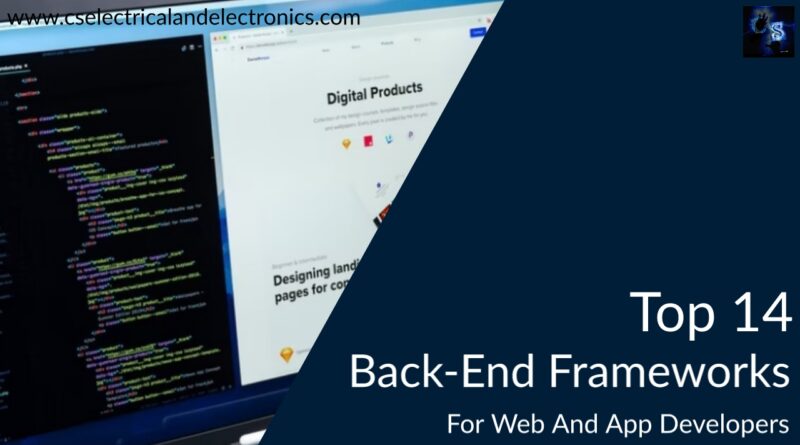Top 14 Back-End Frameworks For Web And App Developers In 2022
Hello guys, welcome back to my blog. In this article, I will discuss the top 14 back-end frameworks for web and app developers in 2022, back-end framework for web developers, back-end framework for app developers, etc.
If you have any doubts related to electrical, electronics, and computer science, then ask questions. You can also catch me on Instagram – Chetan Shidling.
Also, read:
- Top 14 Front-End Frameworks For Web And App Developers In 2022
- Top 10 Python Frameworks And Libraries For IoT Engineers
- Top 10 Amazing Python Libraries And Frameworks For Game Developers
Back-End Frameworks For Web And App Developers
Frameworks are designed to reduce the time spent on software development. With the growing standards and complexities involved with web development, frameworks have become an important component of it, leveraging benefits such as time savings, scalability, robustness, security, and integrations.
To make use of frameworks’ capabilities for creating rich and interactive web apps, you must first choose which framework is appropriate for your project. Let’s look at the top 14 back-end frameworks for web and app developers in more depth.
01. Django
Django is a popular open-source backend framework that follows the MVC paradigm and is based on the Python programming language. Instagram, Pinterest, and Coursera are examples of complex and feature-rich database-driven websites and apps built with Django.
Django provides several advantages, including improved pluggability, less code, more reusability, and faster development. All of Django’s actions, including build, read, change, and delete, are performed in Python. Django is used by several well-known websites, including The Washington Times and Mozilla.
02. Laravel
Laravel is an open-source PHP web framework that uses an MVC architecture to create Symphony-based web applications. Laravel comes with specialized dependency management and a modular packaging mechanism. Laravel provides a variety of ways to access relational databases, as well as application management and deployment tools. Laravel also comes with an MIT license and GitHub-hosted source code. Laravel is an excellent choice for PHP web application development because of all of these characteristics.
03. Ruby on Rails
Ruby on Rails (RoR) or Rails, as it is more often known, is an MIT-licensed server-side web application framework. RoR is an MVC framework that includes basic database structures, web pages, and web services. Rails interfaces with CSS, JavaScript, and HTML, and data is sent through XML or JSON. Rails prioritize software engineering patterns such as the active record pattern, convention over configuration (CoC), and don’t repeat yourself (DRY).
04. ExpressJS
Express, often known as Express.js, is a Node.js web application framework for creating APIs and online applications. The MIT license is used to provide this framework. Express is a MEAN and MERN stack backend component and is a typical Node.js server framework. Express.js is a godsend for developers who want to create high-quality web apps in a short amount of time. Node.js can handle thousands of concurrent client requests.
05. CakePHP
CakePHP is a popular open-source framework developed in PHP and based on Ruby on Rails principles. It is based on the MVC design and is free to use under the MIT license. Because of its sophisticated capabilities, it is a popular option among major web development businesses. CakePHP makes use of well-known software design and engineering ideas such as active record, MVC, convention over configuration, and data mapping, to mention a few.
06. Flask
Flask is a Python-based microweb framework that requires no other libraries or tools. This backend lacks form validation, a database abstraction layer, and components that rely on third-party services. Flask supports extensions that add functionality in a way that makes them appear to be built into the framework.
07. Asp.Net
ASP.NET Core is a free and open-source framework that builds on the success of ASP.NET, a widely used backend developed in collaboration with the.NET Foundation. ASP.NET Core is a modular framework that runs on both Windows and.NET Core and supports the entire.NET Framework.
08. Spring Boot
Spring Framework is a Java platform inversion of control container and an open-source application framework. The framework’s basic functionalities may be used by Java applications. Many extensions are available for developing web apps based on the Java EE framework.
09. Koa
The Express team created Koa as a web framework to provide a more expressive, sturdier, and stronger basis for APIs and online applications. Koa users may eliminate callbacks and improve error handling by using async functions. Koa is devoid of any core Middleware and provides users with a variety of fast server writing techniques.
10. Phoenix
Phoenix is an Elixir programming language-based development framework. It is built on the Plug library and the Cowboy Erlang framework and follows the MVC paradigm. Phoenix was created to make it easier to build scalable, high-performance applications. It includes the Cowboy server’s request/response capabilities as well as real-time external client communication through Websockets and agnostic channels.
11. Meteor
Meteor, a free, open-source, and fully-featured platform for creating modern mobile and online apps, is also developed in Node.js. It’s a full-stack framework that employs JavaScript on both the backend and the frontend to help users create real-time apps more quickly. Meteor also includes Cordova out of the box, allowing you to transform your web app into a native iOS and Android app.
12. NestJS
NestJS is a Node.js framework for creating scalable and efficient backend applications. It is built on the Express.js framework, although it may also be set to utilize Fastify. It takes influence from a variety of places to give a more comprehensive development experience, and it even uses TypeScript, so the syntax is quite close to that of Angular (a front-end framework).
13. Hapi
Hapi is a commercially available web application server and open-source framework. It is well-known for creating proxy servers, REST APIs, and other desktop applications due to its dependability and security features. It comes with many built-in plugins, so you won’t have to rely on unauthorized middleware.
14. Kotlin
Kotlin is a Java Virtual Machine backend programming language. Because it has Google’s official backing, it is highly recommended for Android development. Another fascinating aspect about Kotlin is that it originated in industry rather than academics. As a result, it becomes a useful tool to use with Java and is as common as Java. Because it is entirely compatible with Java, Kotlin will have a significant influence on future backend development. Aside from that, the programmers would have access to large libraries that would allow them to build succinct code. Therefore, Kotlin is preferred by over 61 percent of engineers with more than 5 years of expertise.
Overall, choosing the proper tech stack for web development, including backend frameworks, isn’t easy, but it all relies on the application’s use case and the technology that goes with it. Although most developers prefer to work with known frameworks, because businesses are continuously transitioning to newer technologies, they are sometimes forced to try their hand at a new framework they have never used before. Experimenting with new frameworks in uncharted areas, on the other hand, maybe both be entertaining and educational.
I hope this ” Back-End Frameworks For Web And App Developers ” article may help you all a lot. Thank you for reading ” Back-End Frameworks For Web And App Developers “.
Also, read:
- 100+ C Programming Projects With Source Code, Coding Projects Ideas
- 1000+ Interview Questions On Java, Java Interview Questions, Freshers
- App Developers, Skills, Job Profiles, Scope, Companies, Salary
- Applications Of Artificial Intelligence (AI) In Renewable Energy
- Applications Of Artificial Intelligence, AI Applications, What Is AI
- Applications Of Data Structures And Algorithms In The Real World
- Array Operations In Data Structure And Algorithms Using C Programming
- Artificial Intelligence Scope, Companies, Salary, Roles, Jobs
Author Profile
- Chetu
- Interest's ~ Engineering | Entrepreneurship | Politics | History | Travelling | Content Writing | Technology | Cooking
Latest entries
 All PostsApril 19, 2024What Is Vector CANoe Tool, Why It Is Used In The Automotive Industry
All PostsApril 19, 2024What Is Vector CANoe Tool, Why It Is Used In The Automotive Industry All PostsApril 13, 2024What Is TCM, Transmission Control Module, Working, Purpose,
All PostsApril 13, 2024What Is TCM, Transmission Control Module, Working, Purpose, All PostsApril 12, 2024Top 100 HiL hardware in loop Interview Questions With Answers For Engineers
All PostsApril 12, 2024Top 100 HiL hardware in loop Interview Questions With Answers For Engineers All PostsMarch 22, 2024Driver Monitoring Systems In Vehicles, Working, Driver Sleepy Alert
All PostsMarch 22, 2024Driver Monitoring Systems In Vehicles, Working, Driver Sleepy Alert








